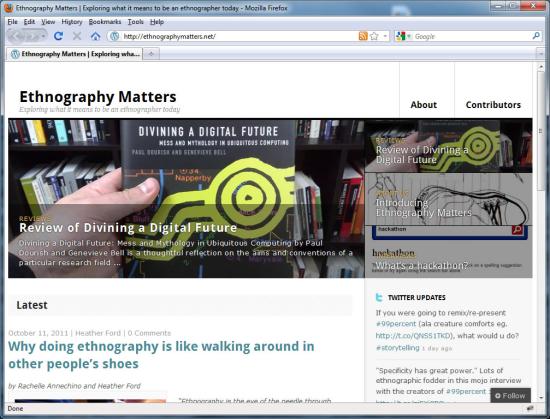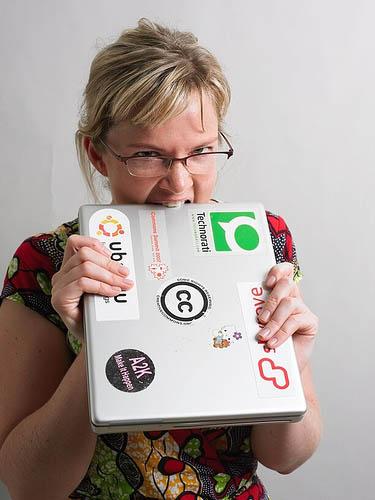A new blog, Ethnography Matters (ethnographymatters.net), was launched this week by assistant professor Jenna Burrell, along with two I School alumnae. The blog will focus on ethnography and technology, with practical advice for practicing ethnographers and other technology researchers.
The idea for the blog first occurred to Heather Ford, who graduated from the I School in May 2011 and started a new job in June as an ethnographer for a software-development company focused on the developing world. “Since I’m the only ethnographer on this project, I found I really wanted advice from other ethnographers in the field,” she explained.
Ford decided to team up with Burrell and fellow I School alumna Rachelle Annechino, now an ethnographic researcher at Prevention Research Center. The blogging team also includes Tricia Wang, an ethnographer and sociologist from UCLA who studies technology use in the U.S., Mexico, and China.
Burrell was excited to be working with her former students. “When Heather and Rachelle approached me about contributing to the blog, I knew it would be worth my time and energy,” said Burrell. “I have a lot of research and ideas that I’d love to discuss with others, both inside the university and out.”
The team hopes that the new blog will be a useful resource for other practicing ethnographers and technology researchers — especially those who feel isolated from other related researchers.
Ethnography is a research method that aims to gain a rich perspective on communities of users in the context of their everyday lives. “The practice of ethnography originated in the field of anthropology,” explained Ford. “The classic ethnographer is a ‘participant observer’, deeply immersed in the community they’re studying.” As researchers turn their focus to the use of technology, they are figuring out how to apply the tools of ethnography to the online world. “What does it mean to be ‘deeply immersed’ in an online community?” asked Ford. “People are asking a lot of new questions.”
The blog is also driven by the belief that, when studying the use of technology, the context of use is important — especially when the designers are based in Silicon Valley, but the products are designed for a global context. The gap between the designers’ community and the users’ is especially evident in technology for the developing world. “I think there’s not enough focus on ethnography as a research method in technology companies,” said Ford. “It’s not enough to focus on data and analytics; it’s also important to have researchers embedded in the communities of use.”
With a shared background studying technology use in the developing world, the team members are committed to the value of an ethnographic approach to research. That approach provided the blog title’s double meaning: a focus on the physical artifacts (“matters”) of technology use, and the belief that ethnography does, in fact, matter.
“I have a vested interest in ethnographic research being used outside of the academy,” said Burrell. “I just hope the blog sparks conversations.”













